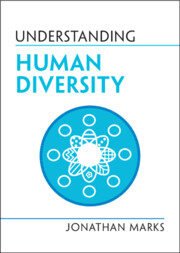
- Publisher:
- Cambridge University Press
- Online publication date:
- August 2024
- Print publication year:
- 2024
- Online ISBN:
- 9781009534314

No two people are the same, and no two groups of people are the same. But what kinds of differences are there, and what do they mean? What does our DNA say about race, gender, equality, or ancestry? Drawing on the latest discoveries in anthropology and human genetics, Understanding Human Diversity looks at scientific realities and pseudoscientific myths about the patterns of diversity in our species, challenging common misconceptions about genetics, race, and evolution and their role in shaping human life today. By examining nine counterexamples drawn from popular scientific ideas, that is to say, examinations of what we are not, this book leads the reader to an appreciation of what we are. We are hybrids with often inseparable natural and cultural aspects, formed of natural and cultural histories, and evolved from remote ape and recent human ancestors. This book is a must for anyone curious about human genetics, human evolution, and human diversity.
‘This book presents several interpretations that challenge conventional views on genetics and anthropology … Overall, Marks presents alternative interpretations of genetic research, suggesting a more complex view of human diversity that prioritizes culture, history and social context … his critiques of genetic determinism, racial essentialism and human evolution [are] both engaging and sharp. His playful tone helps to deflate overly serious or misguided claims, bringing a more human touch to the discussions of biology and anthropology.’
Gustaaf Houtman Source: Anthropology Today
‘Appearances may be not only deceptive, but also dangerous. Jon Marks explains with his usual clarity, compassion, and sometimes risqué humor why our diversity both as a species and as individuals is normal, inevitable, and should be celebrated, not condemned. Moreover, ‘we are genetically programmed to survive by learning, and to do so in unique, local ways.’ What we learn to do, unfortunately, is not always wise or wonderful. Marks shows us how easy it is for our sort of animal to misuse our diversity to excuse selfishness, self-righteousness, the enslavement of others, and even murder. Do yourself and everyone one you know a favor. Read this book.’
John Edward Terrell - Field Museum of Natural History, Chicago
‘Marks has crafted a beautifully written and amazingly detailed explanation of human diversity - his writing is as detailed and wondrous as the manifestation of this diversity is on our planet.’
Rob DeSalle - American Museum of Natural History, New York; author of Understanding Race
‘There are few people I trust to guide me reliably on the topic of human difference quite as much as Jonathan Marks. Understanding Human Diversity is an accessible and wonderfully no-nonsense guide to the state of the current science, as well as the history and ethical dimensions of the perennially fraught question of group difference.’
Angela Saini - journalist, and author of Superior and Inferior
‘Over the years, scientists have conjured up analogies and catchy phrases with the aim of making human biology accessible and interesting. Some of the ‘stickiest’ of these witticisms are actually at odds with the state of the science, and do more harm than good to the popular understanding of human biology. In this book, Jonathan Marks deconstructs nine of these misconceptions in highly entertaining and beautifully written chapters. This latest of Marks’s books is a cautionary tale for biologists trying to garner interest in their research, and an enlightening lesson in critical thinking all around.’
Leslea J. Hlusko - Spanish National Research Center on Human Evolution (CENIEH), Burgos, Spain
‘Jonathan Marks is brilliantly blunt, giving us the perfect antidote to genetic determinism.’
Rina Bliss - Associate Professor of Sociology, Rutgers University; author of Rethinking Intelligence: A Radical New Understanding of Our Human Potential; Social by Nature: The Promise and Peril of Sociogenomics; and Race Decoded: The Genomic Fight for Social Justice
‘Crucial as it is, our DNA does not define what makes us human, argues biological anthropologist Jonathan Marks in his short, catchy appraisal of human diversity. No chimpanzee, he remarks, ever gave her daughter a twig and said, “Use this well for collecting termites. It belonged to your grandmother.” Humans do pass on such cultural knowledge, along with their genes. Marks tactfully tackles the controversial and complex intersection of genetics and culture with ethnicity and sex, noting 'Human variation is not race'.'
Andrew Robinson Source: Nature
 Loading metrics...
Loading metrics...
* Views captured on Cambridge Core between #date#. This data will be updated every 24 hours.
Usage data cannot currently be displayed.